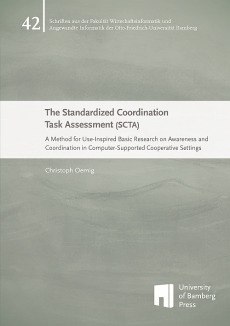Christoph Oemig
The Standardized Coordination Task Assessment (SCTA)
A Method for Use-Inspired Basic Research on Awareness and Coordination in Computer-Supported Cooperative Settings
Reihe: Schriften aus der Fakultät Wirtschaftsinformatik und Angewandte Informatik der Otto-Friedrich-Universität BambergToday’s modern world often affords individuals to form teams to work together towards shared goals and objectives. The need for tools to digitally support collaboration distributed in time and space increased over the past decades significantly with a recent sudden increase due to the Corona pandemic crisis. The research goal in the field of computer-supported cooperative work (CSCW) has always been to design systems that facilitate collaboration based on the understanding of groups and social interaction – especially on how people coordinate their work.
In the real-world coordination happens in a seemingly seamless and effortless way. However, the resulting mechanisms translated to digital systems often provide a clumsy and awkward experience as users lack the means for subtle and rich interaction beyond the spoken word. After numerous failures revealing system deficits and a large number of ethnographic studies, researchers identified awareness to become the support mechanism for effortless coordination in digital systems. Yet, instead of addressing the problem using appropriate methods and tools, researchers found themselves trapped in circular reformulations of concepts and evaluations of prototypes on the basis of disciplinary preferences ignoring the basic characteristics of the objects of interest. Even worse, the most basic design tensions stemming from a use-inspired perspective have not been resolved indicating a substantial problem with the evaluation of awareness and coordination support. Effortless coordination cannot be reached without being measured, thus not without an appropriate measurement approach.
This thesis introduces an appropriate assessment method for the efforts related to awareness and coordination support in cooperative settings – the STANDARDIZED COORDINATION TASK ASSESSMENT (SCTA). Applying a use-inspired basic research driven approach it creates and leverages an effort-based operationalization of the two constructs derived from literature and especially from a cognitive perspective. A highly automated and scalable framework delivers quantitative results to be used for hypotheses validations that allows a benchmark-based approximation of effortless coordination. At the same time the method opens the door for a lot more use-inspired basic research to resolve many of the still open design tensions and challenges.

